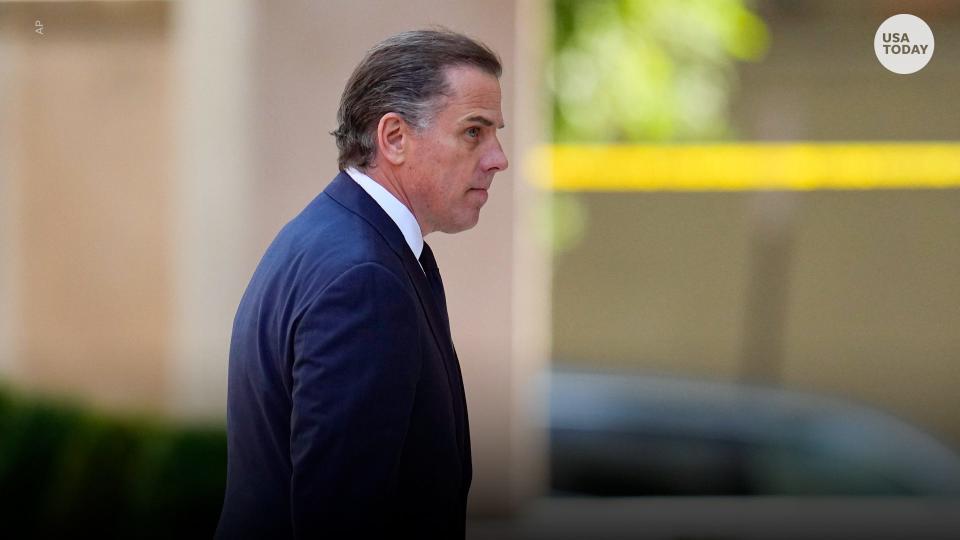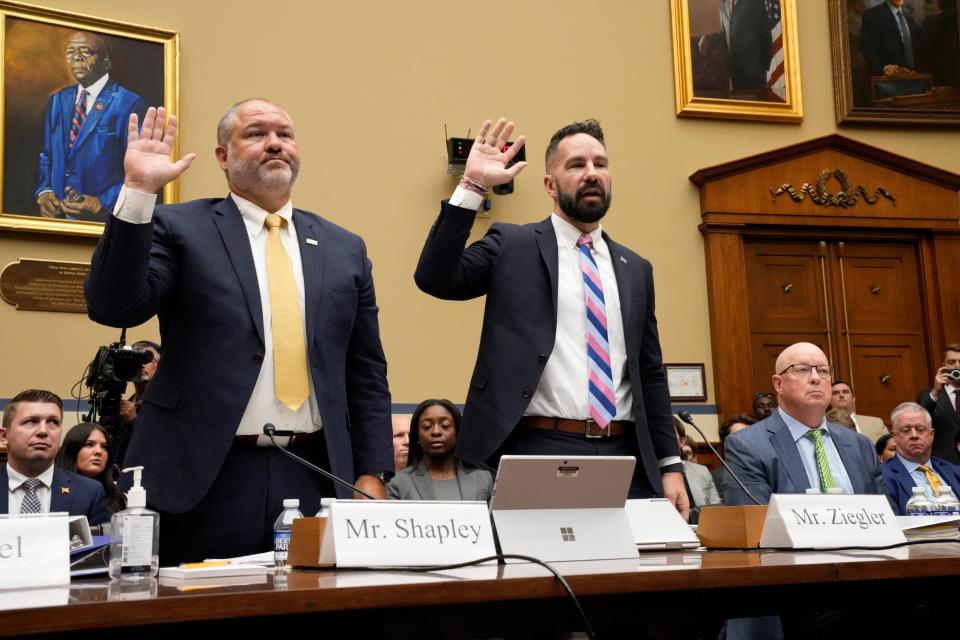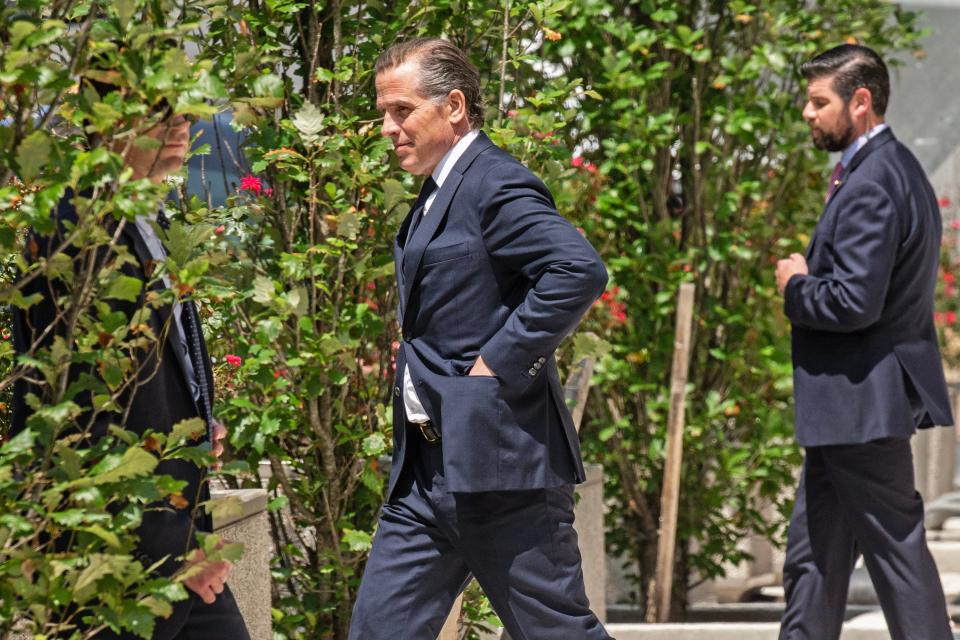Hunter Biden plea hearing features dramatic twists and turns, and a cliffhanger ending
Hunter Biden’s legal thriller continues after a federal judge refused to accept a plea deal for his tax-evasion charges because of a last-minute drama over the fine print.
U.S. District Judge Maryellen Noreika wanted more time to study a deal that began the day with a promise to cap a five-year federal investigation and ended with a cliffhanger rather than riding off into the sunset.
“I know you want to get this over with and I am sorry,” Noreika told Biden. “But I want to be careful.”
The decision added to twist to the long-running legal saga of criminal, civil and Republican congressional investigations of Biden and his father, President Joe Biden.
“It’s very unusual for a plea deal to collapse like this in front of a judge, but it’s not that unusual in these types of cases,” where concern over the ultimate sentence to be imposed may exist because a defendant could potentially be the subject of investigations in multiple jurisdictions, said Joe Valenti, a former federal counterterrorism analyst who is now a partner at Saul Ewing.

What are the charges against Biden and what are Republicans criticizing?
U.S. Attorney David Weiss in Delaware charged Biden with two misdemeanor counts of failing to pay taxes and a gun possession violation. Biden pleaded not guilty Wednesday after the plea deal collapsed.
Prosecutors said Hunter Biden took in $2.4 million in income in 2017 and $2.1 in 2018 through Ukrainian energy firm Burisma, a Chinese-development firm, as well as domestic business interests and legal services.
Leo Wise, an assistant U.S. attorney, said an accountant prepared Biden's taxes both of those years, but his corporate and personal taxes were not paid. During this period, Hunter Biden made large cash withdrawals and covered other expenses like car payments on a Porsche, Wise said.
Biden told the court a "third party" paid the back taxes along with interest and fees pursuant to a personal loan he has not begun to repay.
Prosecutors recommended probation for the tax charges, despite each carrying a maximum sentence of 12 months in prison. The agreement over the gun charge anticipated a pretrial diversion program that would wipe the charge off Biden’s record if he complied.
House Republicans called the agreement a “sweetheart deal” for lack of jail time. But Weiss and Noreika was appointed by former President Donald Trump. The White House has denied interfering.
The day before the hearing, Rep. Jason Smith, R-Mo., urged Noreika to reject the plea deal because of alleged political influence. Smith, chairman of the House Ways and Means Committee, said Biden “appears to have benefited from political interference which calls into question the propriety of the investigation of the U.S. Attorney’s Office.”
"I have not had time to review those submissions," Noreika said of Smith’s filing and another from the Heritage Foundation.
Legal experts said Biden has been treated harshly because the charges he faces are rarely prosecuted.
A Syracuse University study found that from 2013 to 2017, the Justice Department prosecuted 35,758 cases with a firearm violation as the lead charge, but only 614 cases involved unlawful shipment, transfer, receipt or possession of a firearm by a drug addict.
“These charges are rarely brought,” said Renato Mariotti, a former federal prosecutor now practicing at Bryan Cave Leighton Paisner LLP. “It’s unusual.”

Why did the plea deal collapse?
During the hearing, prosecutors and defense lawyers disagreed about the fine print.
The derailment began as Noreika asked Hunter Biden standard questions to ensure he was accepting the deal willingly and knowingly. He said he wouldn’t be pleading guilty to the tax charges if not for the diversion program for the gun charge.
The judge asked if it was a package deal, but prosecutor Wise said the tax agreement “stands alone.” This prompted the hearing to grind to a halt.
After the lawyers conferred, Wise pointed to a paragraph amid the paperwork and said, “We can’t get around this.”
"We will rip it up then," Biden attorney Christopher Clark replied.
Noreika told the lawyers to confer. When she resumed questioning Biden, he said that he would still plead to the tax charges if the diversion agreement were ruled invalid and if it granted him no immunity for further prosecution related to his taxes.
Noreika then turned her attention to the "unique" and "broad" nature of the immunity granted by the diversion agreement. She asked whether the immunity deal would prevent prosecutors from bringing charges for representing foreign governments.
Wise said it did not, but Clark disagreed.
"Then there is no deal," Wise replied.
After a recess, Clark told the judge that lawyers had clarified that the immunity agreement includes tax and drug charges from 2014 to 2019, as well as any charges related to the firearm in the case. But Noreika halted the hearing before asking Biden to officially enter his guilty plea so she could explore details of the diversion agreement.
“It seems to me like you are saying ‘just rubber stamp the agreement, Your Honor,’” Noreika said.
Legal experts said assurances against prosecution are often nuanced, which can leave defendants nervous.
“Most defendants, when they agree to a plea deal, don’t want to be looking over their shoulder for any other U.S. government prosecutor,” Valenti said.

Hearing didn't cover potential sanctions for Biden team lawyer
Another potential subplot never materialized.
Noreika had questioned in the court docket whether she should sanction a lawyer from one of Biden’s firms for allegedly trying to seal the filing from Smith’s lawyer, Theodore Kittila.
"It appears that the caller misrepresented her identity and who she worked for in an attempt to improperly convince the Clerk's Office to remove the amicus materials from the docket," the order stated, commanding Biden's attorneys explain why the court shouldn't consider sanctions for "misrepresentations to the court."
Jessica Bengels is the lawyer at Latham and Watkins in New York City who contacted the U.S. District Court clerk’s office to ask about how to seal filings in Hunter Biden’s tax case, according to a court filing.
Bengels, a lawyer who worked 18 years at the firm, provided a statement saying she hadn’t worked on the case other than to research the docket and how to file electronically. She said she called the clerk’s office Tuesday to ask how to restrict confidential material from the court file and that there may have been some confusion in dealing with two clerks.
“I am completely confident that I never indicated I was calling from Mr. Kittila’s firm or that I worked with him in any way,” Bengels said.
Noreika didn’t mention the incident during the hearing.
White House continues to support Hunter Biden
In court, Biden said he had been in six inpatient rehabilitation programs in the past 20 years, primarily seeking help for alcohol addiction, most recently in 2018. He also shared he's been sober since 2019.
By his own account in his memoir “Beautiful Things,” Biden battled drug addiction and for periods during 2018 smoked crack “every 15 minutes.
Karine Jean-Pierre, the White House press secretary, said Wednesday that Hunter Biden is a private citizen facing a personal matter and his parents support him.
“As we have said the president, the first lady, they love their son, and they support him as he continues to rebuild his life,” she said. “This case was handled independently as all of, you know.”
Legal expert: plea deal still expected because case 'isn't a whodunit'
Legal experts expect prosecutors and defense lawyers to reach a plea deal because the facts of the cases – unpaid taxes, gun ownership – are largely not in dispute.
Noreika gave the sides 30 days to provide written arguments in the case.
“I would bet on negotiating a deal. It’s very unlikely this goes to trial,” Valenti said. “This isn’t a whodunit case.”
This article originally appeared on USA TODAY: Hunter Biden plea hearing provides drama. How will it all end?
